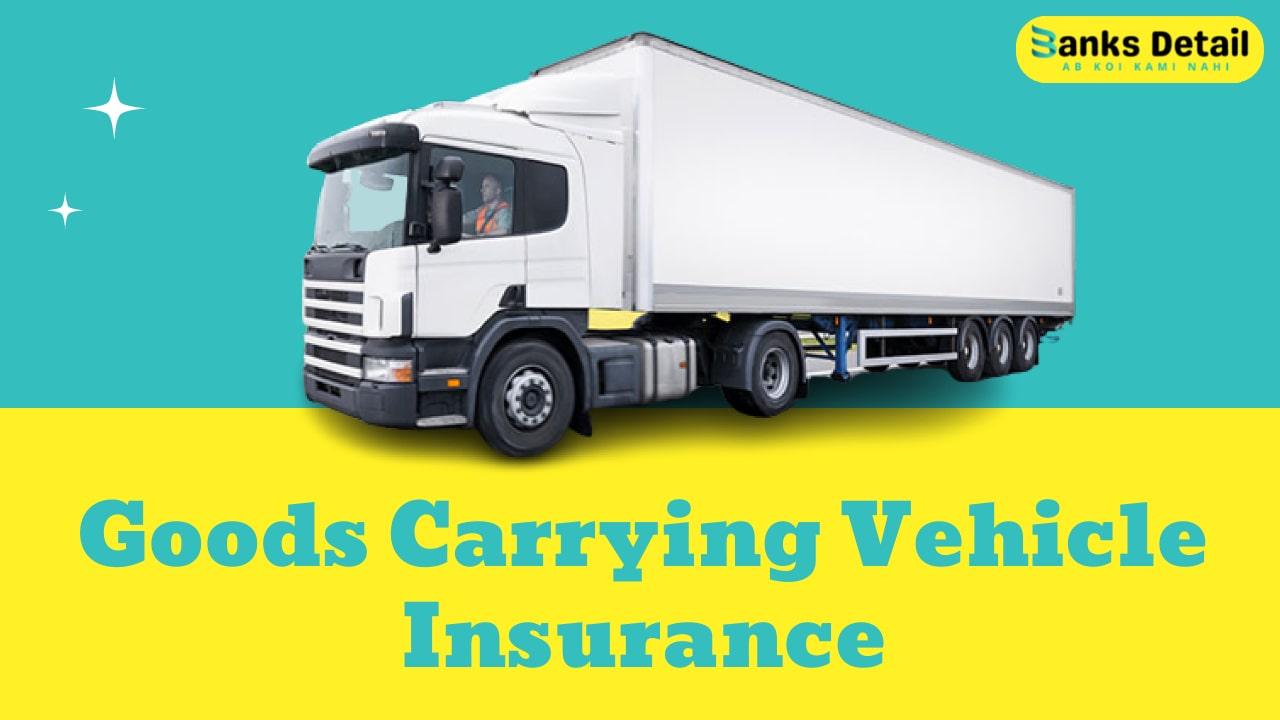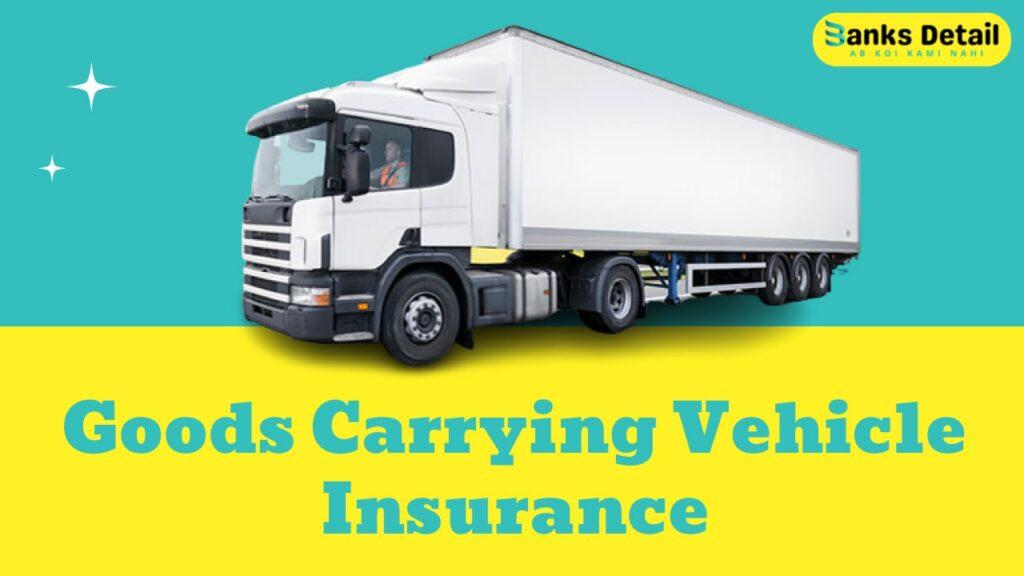Goods Carrying Vehicle Insurance | Protect Your Business and Drivers

Accidents, theft, and damage are unfortunate events that can significantly impact your goods carrying vehicle, leading to unexpected expenses and potential disruptions to your business operations.
To safeguard your valuable assets and ensure peace of mind, it is crucial to have the right insurance coverage in place.
Goods carrying vehicle insurance, also known as commercial vehicle insurance, provides the necessary protection against a range of risks, offering financial support for repairs, replacements, and liability claims.
In this article, we will explore the importance of goods carrying vehicle insurance and how it can benefit businesses and drivers.

Understanding Goods Carrying Vehicle Insurance
Goods carrying vehicle insurance is specifically designed for vehicles involved in commercial activities, such as transporting goods or providing delivery services.
This type of insurance offers coverage for a variety of risks, including accidents, theft, and damage caused to your vehicle or third-party property.
It serves as a safety net, shielding your business from substantial financial losses and ensuring smooth operations even in the face of unexpected events.
Why is Goods Carrying Vehicle Insurance Important?
Goods carrying vehicle insurance is important for businesses that use vehicles to transport goods because it can protect them from financial losses in the event of an accident or other unforeseen event.
For example, if a goods-carrying vehicle is involved in an accident, the insurance company will pay for the cost of repairs to the vehicle, as well as any medical expenses for the driver and passengers.
If the vehicle is stolen, the insurance company will pay for the cost of replacing it. And if the goods that are being transported are damaged, the insurance company will pay for the cost of replacing them.
Types of Goods Carrying Vehicle Insurance
- Third-Party Liability Insurance: This is the minimum legal requirement in most jurisdictions. Third-party liability insurance covers the damages caused to third-party property or individuals as a result of an accident involving your goods-carrying vehicle. It provides financial protection against legal liabilities, including legal defense costs and compensation claims.
- Comprehensive Insurance: Comprehensive insurance offers broader coverage, including protection against damages to your own vehicle due to accidents, theft, vandalism, natural disasters, or other unforeseen incidents. It not only covers third-party liabilities but also ensures your own vehicle is protected from a wide range of risks.
Benefits of Goods Carrying Vehicle Insurance
1. Financial Protection
Goods carrying vehicle insurance provides the necessary financial protection to deal with potential losses.
Whether it’s repairing damages to your vehicle, replacing stolen goods, or compensating third parties for property damage or bodily injuries, the insurance policy can alleviate the financial burden, allowing you to focus on your core business operations.
2. Peace of Mind
Knowing that your goods carrying vehicle is adequately insured brings peace of mind. Unexpected incidents can be stressful, but with the right insurance coverage, you can have confidence that your business is protected against unforeseen circumstances.
This allows you to concentrate on serving your customers and growing your enterprise without worrying about the potential financial ramifications of accidents or theft.
3. Compliance with Legal Requirements
Having appropriate goods carrying vehicle insurance ensures compliance with legal requirements. Operating a commercial vehicle without insurance can lead to severe penalties, legal consequences, and potential business disruptions.
By obtaining the necessary insurance coverage, you stay on the right side of the law and avoid unnecessary legal troubles.
4. Flexibility and Customization
Goods carrying vehicle insurance policies can be tailored to meet the specific needs of your business. Whether you have a single vehicle or a fleet of trucks, insurers offer flexible options to accommodate your requirements.
You can choose the coverage limits, deductibles, and additional features that align with your business model and risk appetite.
5. Assistance with Repairs and Replacements
In the event of an accident or damage to your goods carrying vehicle, insurance companies often have a network of authorized repair shops and service providers.
These partnerships facilitate the repair process, ensuring that your vehicle is back on the road as soon as possible. In cases of severe damage or total loss, the insurance policy can cover the cost of replacing your vehicle, minimizing downtime for your business.
How to Choose Goods Carrying Vehicle Insurance
When it comes to selecting the right goods carrying vehicle insurance, it’s important to consider several factors to ensure you make an informed decision.
Choosing the appropriate insurance coverage for your business’s needs will provide financial protection, peace of mind, and support in case of accidents, theft, or damage. Here are some key considerations to help you choose the right goods carrying vehicle insurance:
1. Assess Your Insurance Needs
Start by evaluating your specific insurance requirements. Consider factors such as the type and size of your business, the number of vehicles you own or operate, the goods you transport, and the routes you take. Assessing your needs will help you determine the level of coverage required, whether you need comprehensive insurance or just third-party liability coverage.
2. Research Insurance Providers
Conduct thorough research on insurance providers that offer goods carrying vehicle insurance. Look for reputable companies with a strong track record in the industry and positive customer reviews. Consider factors such as their financial stability, claim settlement process, customer service quality, and the range of insurance products they offer.
3. Compare Coverage Options
Once you have a list of potential insurance providers, compare the coverage options they offer. Look for policies that align with your specific needs and provide adequate protection. Pay attention to aspects such as third-party liability coverage limits, coverage for damages to your own vehicle, coverage for theft or vandalism, and coverage for natural disasters or other unforeseen events.
4. Evaluate Policy Exclusions and Limitations
Carefully review the policy exclusions and limitations of each insurance provider. These are the scenarios or circumstances in which the insurance coverage may not apply.
Understanding these exclusions will help you make an informed decision and avoid surprises when filing a claim. Common exclusions may include intentional damage, driving under the influence, or using the vehicle for unauthorized purposes.
5. Consider Deductibles and Premiums
Evaluate the deductibles and premiums associated with different insurance policies. Deductibles are the amount you must pay out of pocket before the insurance coverage kicks in, while premiums are the recurring payments you make for the policy.
Consider your budget and cash flow when determining the deductibles and premiums that work best for your business. Remember that higher deductibles usually lead to lower premiums, but it’s crucial to strike a balance that suits your financial situation.
6. Check for Additional Benefits and Services
Some insurance providers offer additional benefits or services as part of their goods-carrying vehicle insurance policies. These may include roadside assistance, towing services, coverage for medical expenses, or personal accident coverage for drivers.
Assess these additional benefits and services and determine if they add value to your insurance package.
7. Seek Professional Advice
If you’re unsure about the best insurance options for your goods carrying vehicle, consider seeking advice from insurance professionals or brokers. They can provide personalized guidance based on your business’s unique circumstances and help you choose the most appropriate coverage.
8. Review and Renew Regularly
Lastly, remember that insurance needs can change over time. Review your goods carrying vehicle insurance policy regularly, especially when there are significant changes in your business operations or the value of your vehicles. Stay up to date with policy renewals to ensure continuous coverage without any gaps.
By following these steps and conducting thorough research, you can choose the right goods carrying vehicle insurance that offers comprehensive coverage, fits your budget, and provides the necessary protection for your business and assets.
Take the time to make an informed decision, as it can have a significant impact on the financial security and peace of mind of you and your business.
Frequently Asked Questions (FAQs)
What is goods carrying vehicle insurance?
Goods carrying vehicle insurance, also known as commercial vehicle insurance, is a type of insurance coverage specifically designed for vehicles involved in commercial activities, such as transporting goods or providing delivery services.
It provides financial protection against accidents, theft, and damages to the vehicle or third-party property.
What does goods carrying vehicle insurance cover?
Goods carrying vehicle insurance covers various risks, depending on the type of policy chosen. It can include coverage for damages to the insured vehicle due to accidents, theft, vandalism, natural disasters, and other unforeseen incidents.
It also provides coverage for third-party liabilities, including property damage and bodily injury caused by the insured vehicle.
Do I need goods carrying vehicle insurance?
Yes, if you use your vehicle for commercial purposes, it is highly recommended to have goods carrying vehicle insurance.
It not only protects your vehicle and cargo but also helps you comply with legal requirements related to insurance coverage for commercial vehicles.
What are the types of goods carrying vehicle insurance?
The two main types of goods carrying vehicle insurance are third-party liability insurance and comprehensive insurance.
Third-party liability insurance covers damages to third-party property or individuals caused by the insured vehicle.
Comprehensive insurance offers broader coverage, including damages to the insured vehicle itself.
How can I choose the right goods carrying vehicle insurance?
To choose the right goods carrying vehicle insurance, consider factors such as your specific insurance needs, the reputation and reliability of insurance providers, the coverage options and exclusions, deductibles and premiums, additional benefits or services offered, and seek professional advice when necessary.
Can I renew my goods carrying vehicle insurance online?
Yes, many insurance providers offer online renewal options for goods carrying vehicle insurance. You can visit their websites or use online insurance comparison platforms to renew your policy conveniently.
What should I do in case of an accident or damage to my goods carrying vehicle?
In case of an accident or damage, inform your insurance provider immediately. They will guide you through the claim process, including documentation, assessment of damages, and repairs or compensation based on the terms and conditions of your policy.
Can I add multiple vehicles under a single goods carrying vehicle insurance policy?
Yes, if you have a fleet of goods carrying vehicles, you can often add multiple vehicles under a single policy. This is known as fleet insurance and can provide cost savings and administrative convenience.
Are there any discounts available for goods carrying vehicle insurance?
Insurance providers may offer various discounts on goods carrying vehicle insurance policies.
These can include discounts for having a good driving record, installing security devices in your vehicles, or insuring multiple vehicles under the same policy.
Check with your insurance provider about the available discounts and eligibility criteria.
Can I cancel my goods carrying vehicle insurance policy?
Yes, you can cancel your goods carrying vehicle insurance policy, but it is important to review the terms and conditions of your policy regarding cancellation fees or any refund eligibility.
Notify your insurance provider about your intention to cancel and follow their guidelines for the cancellation process.
Conclusion
Goods carrying vehicle insurance is an essential investment for businesses and drivers involved in commercial activities.
It provides financial protection, peace of mind, and compliance with legal obligations. By choosing the right insurance coverage, you safeguard your goods carrying vehicle against accidents, theft, and damage, ensuring uninterrupted business operations.
Take the time to compare quotes, review policy terms, and consult with insurance experts to find the most suitable coverage that aligns with your needs and budget.
Protect your business and drive with confidence by securing goods carrying vehicle insurance today.
Read More About:- Insurance, Commercial Vehicle Insurance





